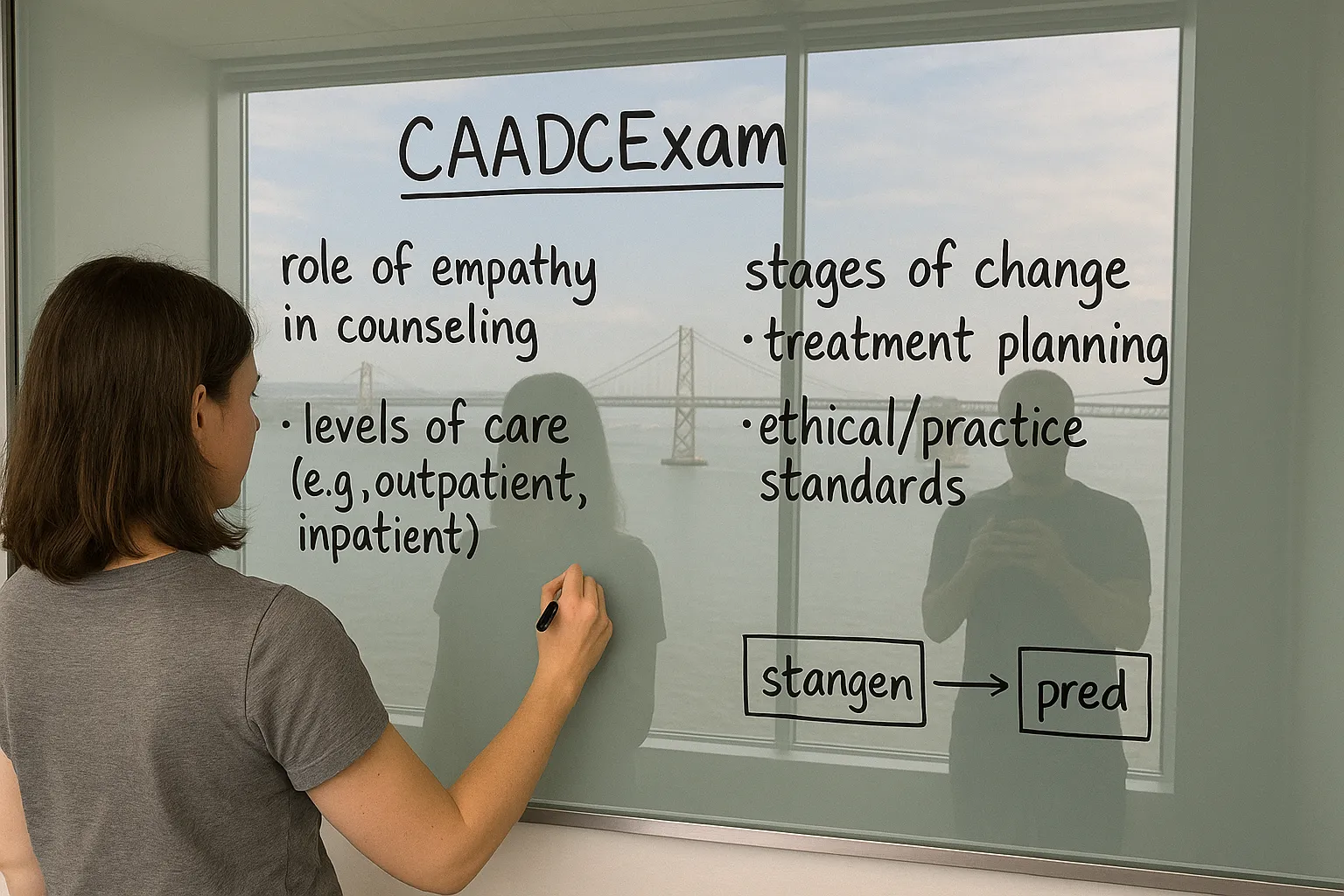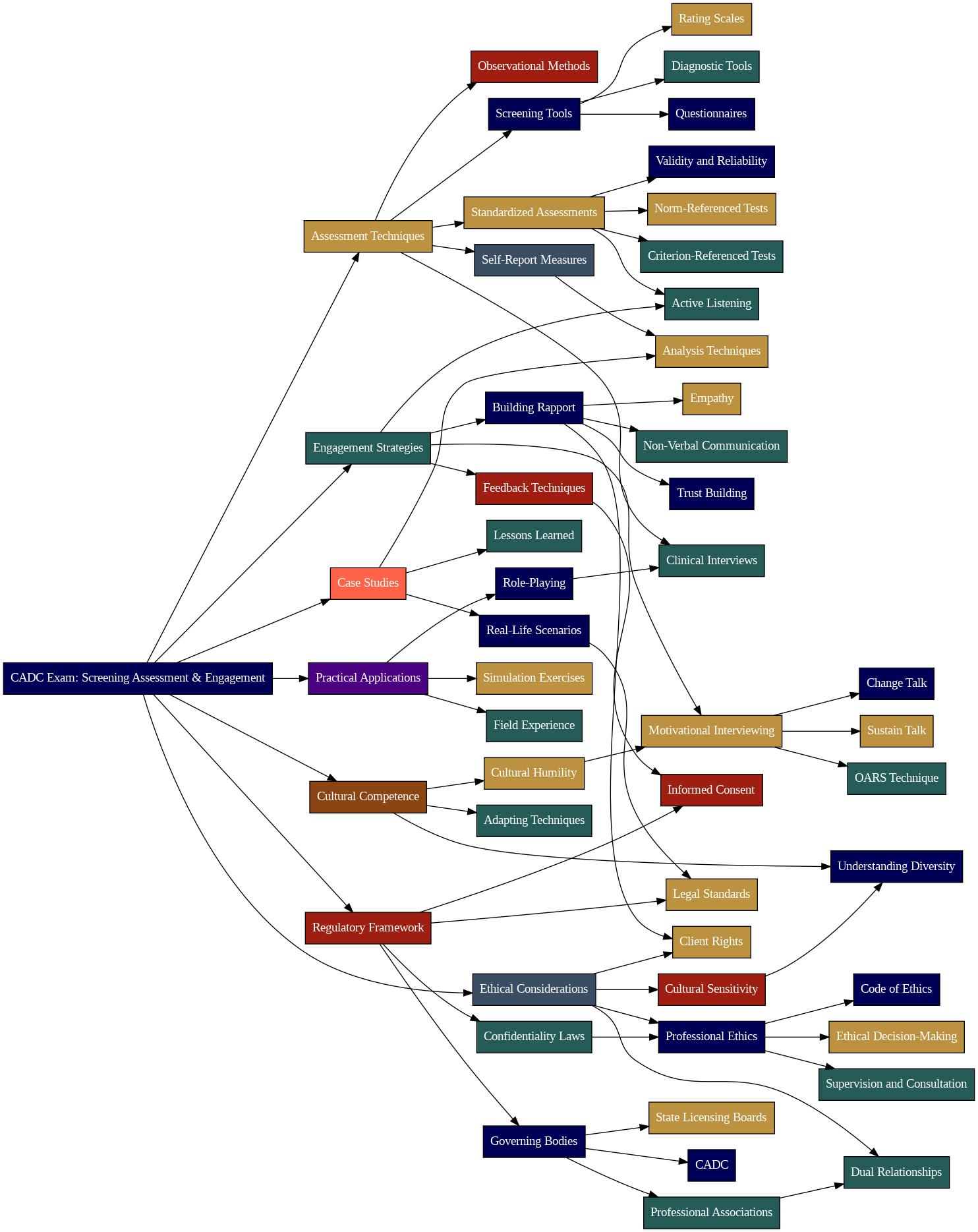Quiz-summary
0 of 29 questions completed
Questions:
- 1
- 2
- 3
- 4
- 5
- 6
- 7
- 8
- 9
- 10
- 11
- 12
- 13
- 14
- 15
- 16
- 17
- 18
- 19
- 20
- 21
- 22
- 23
- 24
- 25
- 26
- 27
- 28
- 29
Information
Premium Practice Questions
You have already completed the quiz before. Hence you can not start it again.
Quiz is loading...
You must sign in or sign up to start the quiz.
You have to finish following quiz, to start this quiz:
Results
0 of 29 questions answered correctly
Your time:
Time has elapsed
Categories
- Not categorized 0%
- 1
- 2
- 3
- 4
- 5
- 6
- 7
- 8
- 9
- 10
- 11
- 12
- 13
- 14
- 15
- 16
- 17
- 18
- 19
- 20
- 21
- 22
- 23
- 24
- 25
- 26
- 27
- 28
- 29
- Answered
- Review
-
Question 1 of 29
1. Question
Jamal, a new client seeking treatment for opioid use disorder at a community mental health center in Jackson, Mississippi, presents with significant trauma history. His assigned LCDC, while competent in general substance use counseling, has limited formal training in trauma-informed care. The LCDC explains the general treatment approach, including group therapy and individual sessions focused on relapse prevention, but omits mentioning their limited experience with trauma-specific interventions. Jamal consents to the treatment plan. Which ethical principle is MOST directly compromised in this scenario?
Correct
Mississippi LCDCs are bound by ethical guidelines emphasizing client autonomy, beneficence, non-maleficence, justice, and fidelity. A core component of these guidelines is ensuring clients have the capacity to make informed decisions about their treatment. This involves a thorough explanation of the nature of the services, potential risks and benefits, alternatives to treatment, the counselor’s qualifications, costs, and the client’s right to refuse or withdraw from treatment at any time, all documented through informed consent. The scenario highlights a situation where the counselor’s actions potentially undermine client autonomy by not fully disclosing all relevant information needed for informed consent, specifically regarding the counselor’s limited experience with a particular therapeutic modality. The LCDC’s ethical obligation is to ensure that clients are fully aware of the counselor’s competencies and any limitations, allowing them to make a truly informed decision about their care. Failing to do so could be considered a violation of ethical principles related to informed consent and potentially harmful to the client. Furthermore, Mississippi regulations require counselors to accurately represent their qualifications and experience. In situations where a counselor lacks specific expertise, referral to another professional or seeking supervision are often ethically mandated.
Incorrect
Mississippi LCDCs are bound by ethical guidelines emphasizing client autonomy, beneficence, non-maleficence, justice, and fidelity. A core component of these guidelines is ensuring clients have the capacity to make informed decisions about their treatment. This involves a thorough explanation of the nature of the services, potential risks and benefits, alternatives to treatment, the counselor’s qualifications, costs, and the client’s right to refuse or withdraw from treatment at any time, all documented through informed consent. The scenario highlights a situation where the counselor’s actions potentially undermine client autonomy by not fully disclosing all relevant information needed for informed consent, specifically regarding the counselor’s limited experience with a particular therapeutic modality. The LCDC’s ethical obligation is to ensure that clients are fully aware of the counselor’s competencies and any limitations, allowing them to make a truly informed decision about their care. Failing to do so could be considered a violation of ethical principles related to informed consent and potentially harmful to the client. Furthermore, Mississippi regulations require counselors to accurately represent their qualifications and experience. In situations where a counselor lacks specific expertise, referral to another professional or seeking supervision are often ethically mandated.
-
Question 2 of 29
2. Question
During a group therapy session at a substance abuse treatment center in Mississippi, a client, Imani, casually mentions a past shoplifting incident from several years ago, unrelated to her current substance use issues. According to Mississippi LCDC ethical guidelines, what is the MOST appropriate initial course of action for the counselor?
Correct
The Mississippi Board of Examiners for Licensed Professional Counselors requires adherence to specific ethical guidelines, including those related to confidentiality, dual relationships, and informed consent. In a scenario where a client, during a group therapy session, discloses past criminal activity (e.g., petty theft) that is unrelated to current treatment goals, the LCDC counselor must prioritize client confidentiality while also considering legal obligations. While Mississippi law does not generally mandate reporting of past petty crimes, the counselor must assess whether the disclosure indicates an ongoing risk of harm to the client or others. The ethical decision-making process involves consulting with supervisors or colleagues, documenting the disclosure and the rationale for the chosen course of action, and ensuring that the client understands the limits of confidentiality. A blanket statement to the group about reporting any criminal activity, without considering the specific context and potential impact on the therapeutic relationship, would be inappropriate. Ignoring the disclosure could create ethical and legal liabilities if the information later becomes relevant to a safety concern. Reporting the past petty theft without a clear and present danger would violate client confidentiality and potentially harm the therapeutic alliance. The best course of action is to acknowledge the disclosure, assess the potential risks, and proceed in a way that balances ethical obligations and client well-being.
Incorrect
The Mississippi Board of Examiners for Licensed Professional Counselors requires adherence to specific ethical guidelines, including those related to confidentiality, dual relationships, and informed consent. In a scenario where a client, during a group therapy session, discloses past criminal activity (e.g., petty theft) that is unrelated to current treatment goals, the LCDC counselor must prioritize client confidentiality while also considering legal obligations. While Mississippi law does not generally mandate reporting of past petty crimes, the counselor must assess whether the disclosure indicates an ongoing risk of harm to the client or others. The ethical decision-making process involves consulting with supervisors or colleagues, documenting the disclosure and the rationale for the chosen course of action, and ensuring that the client understands the limits of confidentiality. A blanket statement to the group about reporting any criminal activity, without considering the specific context and potential impact on the therapeutic relationship, would be inappropriate. Ignoring the disclosure could create ethical and legal liabilities if the information later becomes relevant to a safety concern. Reporting the past petty theft without a clear and present danger would violate client confidentiality and potentially harm the therapeutic alliance. The best course of action is to acknowledge the disclosure, assess the potential risks, and proceed in a way that balances ethical obligations and client well-being.
-
Question 3 of 29
3. Question
Jamal, an LCDC in Mississippi, is working with a client who admits to actively participating in a large-scale drug trafficking operation. The client does not express any intent to harm specific individuals, nor does the operation directly involve children or other vulnerable populations. According to Mississippi ethical guidelines and relevant state laws, what is Jamal’s MOST appropriate initial course of action?
Correct
In Mississippi, an LCDC encountering a situation where a client discloses active participation in a felony, such as drug trafficking, presents a complex ethical and legal dilemma. While confidentiality is paramount, it is not absolute. Mississippi statutes, in alignment with federal regulations like 42 CFR Part 2 (if the program receives federal funding), permit the disclosure of client information in specific circumstances. These circumstances typically include situations where there is a legal obligation to report, such as mandated reporting laws related to child abuse or elder abuse, or when a client poses an imminent threat to themselves or others. Drug trafficking, while a serious crime, does not automatically trigger a mandated reporting requirement unless it directly involves harm or threat to a vulnerable population (e.g., child endangerment due to drug manufacturing in a home). However, if the counselor believes the client’s activities pose a significant and immediate risk to the safety of others, they may have a duty to warn potential victims or notify law enforcement. This decision must be made carefully, balancing the client’s right to confidentiality with the counselor’s ethical and legal obligations to protect public safety. Consultation with a supervisor, legal counsel, and a thorough review of relevant Mississippi laws and ethical guidelines are crucial steps in navigating this complex situation. Premature or unwarranted disclosure could severely damage the therapeutic relationship and expose the counselor to legal repercussions. The counselor must document all steps taken and the rationale behind their decision-making process.
Incorrect
In Mississippi, an LCDC encountering a situation where a client discloses active participation in a felony, such as drug trafficking, presents a complex ethical and legal dilemma. While confidentiality is paramount, it is not absolute. Mississippi statutes, in alignment with federal regulations like 42 CFR Part 2 (if the program receives federal funding), permit the disclosure of client information in specific circumstances. These circumstances typically include situations where there is a legal obligation to report, such as mandated reporting laws related to child abuse or elder abuse, or when a client poses an imminent threat to themselves or others. Drug trafficking, while a serious crime, does not automatically trigger a mandated reporting requirement unless it directly involves harm or threat to a vulnerable population (e.g., child endangerment due to drug manufacturing in a home). However, if the counselor believes the client’s activities pose a significant and immediate risk to the safety of others, they may have a duty to warn potential victims or notify law enforcement. This decision must be made carefully, balancing the client’s right to confidentiality with the counselor’s ethical and legal obligations to protect public safety. Consultation with a supervisor, legal counsel, and a thorough review of relevant Mississippi laws and ethical guidelines are crucial steps in navigating this complex situation. Premature or unwarranted disclosure could severely damage the therapeutic relationship and expose the counselor to legal repercussions. The counselor must document all steps taken and the rationale behind their decision-making process.
-
Question 4 of 29
4. Question
A Mississippi LCDC, working at a private practice in Hattiesburg, discovers during a session that their client, a single mother struggling with opioid addiction, has relapsed. The client tearfully confesses to occasionally leaving her 5-year-old child unsupervised for short periods while she uses. She begs the counselor not to report this, fearing she will lose her child. Considering Mississippi’s mandated reporting laws, 42 CFR Part 2, and the ethical guidelines for LCDCs, what is the MOST ethically and legally sound course of action for the counselor?
Correct
Mississippi LCDCs must understand the interplay between state law, federal regulations (like 42 CFR Part 2 governing confidentiality in substance use treatment), and ethical guidelines provided by professional organizations. A breach of confidentiality, even with good intentions, can have severe legal and ethical repercussions. In this scenario, the counselor’s primary responsibility is to protect client confidentiality while adhering to mandated reporting laws. Consulting with a supervisor or legal counsel is crucial to navigate this complex situation ethically and legally. The correct course of action involves informing the client of the counselor’s legal obligation to report while minimizing the disclosure to only what is legally required and seeking legal guidance. This approach balances the ethical duty of confidentiality with the legal obligation to report imminent harm, adhering to both Mississippi state laws and federal regulations. This requires a nuanced understanding of the limits of confidentiality and the appropriate steps to take when faced with conflicting ethical and legal obligations.
Incorrect
Mississippi LCDCs must understand the interplay between state law, federal regulations (like 42 CFR Part 2 governing confidentiality in substance use treatment), and ethical guidelines provided by professional organizations. A breach of confidentiality, even with good intentions, can have severe legal and ethical repercussions. In this scenario, the counselor’s primary responsibility is to protect client confidentiality while adhering to mandated reporting laws. Consulting with a supervisor or legal counsel is crucial to navigate this complex situation ethically and legally. The correct course of action involves informing the client of the counselor’s legal obligation to report while minimizing the disclosure to only what is legally required and seeking legal guidance. This approach balances the ethical duty of confidentiality with the legal obligation to report imminent harm, adhering to both Mississippi state laws and federal regulations. This requires a nuanced understanding of the limits of confidentiality and the appropriate steps to take when faced with conflicting ethical and legal obligations.
-
Question 5 of 29
5. Question
A Mississippi LCDC, Rev. Elijah, a respected figure in his church and community, provides counseling services at a local treatment center. He begins working with a new client, Darlene, who also attends Rev. Elijah’s church. Darlene confides in Rev. Elijah about her struggles with opioid addiction and past trauma. Recognizing Darlene’s deep faith, Rev. Elijah incorporates prayer and religious teachings into their counseling sessions, believing it will enhance her recovery. He also occasionally shares details about Darlene’s progress with the church’s prayer group, without explicitly naming her, to solicit spiritual support. Rev. Elijah is approached by a member of the church who recognizes the details and asks if Darlene is the one Rev. Elijah is referring to, what is the MOST ethical course of action for Rev. Elijah?
Correct
Mississippi LCDCs operate within a complex ethical landscape governed by state regulations, professional standards, and federal laws like 42 CFR Part 2, which protects the confidentiality of substance use disorder patient records. Ethical decision-making requires a nuanced understanding of these interwoven guidelines. A core principle is client autonomy, encompassing informed consent and the right to self-determination. Dual relationships, where the counselor has more than one relationship (professional and personal) with a client, are generally prohibited due to the potential for exploitation and compromised judgment. Cultural competence is essential, demanding that counselors understand and respect the diverse backgrounds and beliefs of their clients. When faced with ethical dilemmas, counselors should consult established ethical decision-making models, professional codes of ethics (e.g., those provided by NAADAC), and seek supervision from experienced colleagues. Mandated reporting obligations, particularly concerning child abuse or threats of harm to self or others, override confidentiality in specific circumstances. Furthermore, the counselor’s professional conduct both inside and outside the counseling setting reflects upon the profession and requires accountability. A Mississippi LCDC must demonstrate ongoing commitment to ethical principles, legal requirements, and professional development to ensure the well-being of their clients and maintain the integrity of the counseling profession.
Incorrect
Mississippi LCDCs operate within a complex ethical landscape governed by state regulations, professional standards, and federal laws like 42 CFR Part 2, which protects the confidentiality of substance use disorder patient records. Ethical decision-making requires a nuanced understanding of these interwoven guidelines. A core principle is client autonomy, encompassing informed consent and the right to self-determination. Dual relationships, where the counselor has more than one relationship (professional and personal) with a client, are generally prohibited due to the potential for exploitation and compromised judgment. Cultural competence is essential, demanding that counselors understand and respect the diverse backgrounds and beliefs of their clients. When faced with ethical dilemmas, counselors should consult established ethical decision-making models, professional codes of ethics (e.g., those provided by NAADAC), and seek supervision from experienced colleagues. Mandated reporting obligations, particularly concerning child abuse or threats of harm to self or others, override confidentiality in specific circumstances. Furthermore, the counselor’s professional conduct both inside and outside the counseling setting reflects upon the profession and requires accountability. A Mississippi LCDC must demonstrate ongoing commitment to ethical principles, legal requirements, and professional development to ensure the well-being of their clients and maintain the integrity of the counseling profession.
-
Question 6 of 29
6. Question
Aisha, a newly licensed LCDC in rural Mississippi, encounters a client, Mr. Dubois, who is also a distant relative and a prominent member of the local church where Aisha volunteers. Mr. Dubois discloses ongoing domestic violence towards his spouse. Aisha is aware that reporting this incident could severely impact Mr. Dubois’s standing in the community and potentially jeopardize her own reputation within the church. Considering Mississippi’s ethical guidelines for LCDCs, specifically regarding mandated reporting and dual relationships, what is Aisha’s MOST ethically sound course of action?
Correct
Mississippi LCDCs operate within a complex ethical landscape, guided by both the general ethical principles of counseling and the specific regulations outlined in Mississippi state law regarding substance use treatment. Confidentiality, as mandated by 42 CFR Part 2 and state statutes, forms a cornerstone of this practice. However, exceptions exist, particularly concerning mandated reporting of child abuse or neglect, threats of harm to self or others, and court orders. Dual relationships, while often discouraged, require careful navigation, especially in rural Mississippi communities where professional and personal connections may overlap. Informed consent must be obtained before initiating treatment, ensuring clients understand their rights, the nature of the services, and the limits of confidentiality. Ethical decision-making models, such as the Corey, Corey, and Callanan model, provide a framework for resolving ethical dilemmas. Cultural competence is crucial, considering the diverse populations served in Mississippi, including African American, Native American, and other cultural groups. Furthermore, LCDCs must adhere to the ethical guidelines of professional organizations like the Mississippi Association of Addiction Professionals (MAAP) and the National Association for Alcoholism and Drug Abuse Counselors (NAADAC). Failure to uphold these ethical and legal standards can result in disciplinary action by the Mississippi Department of Mental Health, potentially including license suspension or revocation. Understanding these multifaceted ethical considerations is essential for competent and ethical practice as an LCDC in Mississippi.
Incorrect
Mississippi LCDCs operate within a complex ethical landscape, guided by both the general ethical principles of counseling and the specific regulations outlined in Mississippi state law regarding substance use treatment. Confidentiality, as mandated by 42 CFR Part 2 and state statutes, forms a cornerstone of this practice. However, exceptions exist, particularly concerning mandated reporting of child abuse or neglect, threats of harm to self or others, and court orders. Dual relationships, while often discouraged, require careful navigation, especially in rural Mississippi communities where professional and personal connections may overlap. Informed consent must be obtained before initiating treatment, ensuring clients understand their rights, the nature of the services, and the limits of confidentiality. Ethical decision-making models, such as the Corey, Corey, and Callanan model, provide a framework for resolving ethical dilemmas. Cultural competence is crucial, considering the diverse populations served in Mississippi, including African American, Native American, and other cultural groups. Furthermore, LCDCs must adhere to the ethical guidelines of professional organizations like the Mississippi Association of Addiction Professionals (MAAP) and the National Association for Alcoholism and Drug Abuse Counselors (NAADAC). Failure to uphold these ethical and legal standards can result in disciplinary action by the Mississippi Department of Mental Health, potentially including license suspension or revocation. Understanding these multifaceted ethical considerations is essential for competent and ethical practice as an LCDC in Mississippi.
-
Question 7 of 29
7. Question
Jamal, an LCDC in Mississippi, is treating a client, Evelyn, for opioid use disorder. During a session, Evelyn reveals that she has been physically abusing her elderly mother, who has Alzheimer’s disease, out of frustration and exhaustion. Evelyn begs Jamal not to tell anyone, as she is ashamed and fears legal repercussions. According to Mississippi laws and ethical guidelines for LCDCs, what is Jamal’s most appropriate course of action?
Correct
According to Mississippi regulations and ethical guidelines for LCDCs, confidentiality is paramount but not absolute. There are specific instances where an LCDC is legally and ethically obligated to breach confidentiality. These exceptions typically involve situations where there is a risk of harm to the client or others. Duty to warn, stemming from the Tarasoff case and subsequent interpretations in Mississippi law, mandates that therapists take reasonable steps to protect intended victims when a client poses a serious threat of violence. Child abuse reporting laws in Mississippi require mandated reporters, including LCDCs, to report suspected child abuse or neglect. Similarly, elder abuse reporting laws necessitate reporting suspected abuse, neglect, or exploitation of vulnerable adults. Court orders can also compel the disclosure of confidential information, although LCDCs should attempt to advocate for the client’s confidentiality to the extent legally permissible. Finally, if a client provides informed consent to release information, the LCDC is ethically bound to honor that consent, but only to the extent specified in the consent form. The LCDC must carefully weigh the ethical principles of beneficence, non-maleficence, autonomy, and justice when determining whether to breach confidentiality, documenting the decision-making process thoroughly.
Incorrect
According to Mississippi regulations and ethical guidelines for LCDCs, confidentiality is paramount but not absolute. There are specific instances where an LCDC is legally and ethically obligated to breach confidentiality. These exceptions typically involve situations where there is a risk of harm to the client or others. Duty to warn, stemming from the Tarasoff case and subsequent interpretations in Mississippi law, mandates that therapists take reasonable steps to protect intended victims when a client poses a serious threat of violence. Child abuse reporting laws in Mississippi require mandated reporters, including LCDCs, to report suspected child abuse or neglect. Similarly, elder abuse reporting laws necessitate reporting suspected abuse, neglect, or exploitation of vulnerable adults. Court orders can also compel the disclosure of confidential information, although LCDCs should attempt to advocate for the client’s confidentiality to the extent legally permissible. Finally, if a client provides informed consent to release information, the LCDC is ethically bound to honor that consent, but only to the extent specified in the consent form. The LCDC must carefully weigh the ethical principles of beneficence, non-maleficence, autonomy, and justice when determining whether to breach confidentiality, documenting the decision-making process thoroughly.
-
Question 8 of 29
8. Question
An LCDC in Mississippi is working with a client who identifies as Native American and is seeking treatment for alcohol use disorder. Which approach demonstrates the HIGHEST level of cultural competence?
Correct
Cultural competence in counseling involves understanding and respecting the values, beliefs, and practices of diverse cultural groups. This includes recognizing the impact of historical trauma, systemic oppression, and cultural stigma on substance use and mental health. When working with Native American clients, it is essential to be aware of the historical context of colonization, forced assimilation, and loss of cultural identity, which have contributed to higher rates of substance use and mental health issues in these communities. Culturally adapted interventions should incorporate traditional healing practices, respect for elders and tribal customs, and a focus on community and family support. In the scenario presented, the counselor should avoid imposing their own cultural values or assumptions on the client and instead seek to understand the client’s worldview and experiences. Providing resources that are culturally relevant and accessible, such as Native American-specific treatment programs or support groups, is also crucial. Dismissing the client’s cultural background or attempting to force them into mainstream treatment approaches could be detrimental to the therapeutic relationship and the client’s recovery.
Incorrect
Cultural competence in counseling involves understanding and respecting the values, beliefs, and practices of diverse cultural groups. This includes recognizing the impact of historical trauma, systemic oppression, and cultural stigma on substance use and mental health. When working with Native American clients, it is essential to be aware of the historical context of colonization, forced assimilation, and loss of cultural identity, which have contributed to higher rates of substance use and mental health issues in these communities. Culturally adapted interventions should incorporate traditional healing practices, respect for elders and tribal customs, and a focus on community and family support. In the scenario presented, the counselor should avoid imposing their own cultural values or assumptions on the client and instead seek to understand the client’s worldview and experiences. Providing resources that are culturally relevant and accessible, such as Native American-specific treatment programs or support groups, is also crucial. Dismissing the client’s cultural background or attempting to force them into mainstream treatment approaches could be detrimental to the therapeutic relationship and the client’s recovery.
-
Question 9 of 29
9. Question
An LCDC in Mississippi is assigned a new client, Mr. Nguyen, who is a recent Vietnamese immigrant with limited English proficiency and a history of alcohol use disorder. Which of the following actions would BEST demonstrate cultural competence in this situation?
Correct
Cultural competence is the ability to interact effectively with people of different cultures. It involves understanding and respecting cultural differences, being aware of one’s own cultural biases, and adapting counseling approaches to meet the unique needs of each client. In Mississippi, with its diverse population, cultural competence is essential for LCDCs. When working with clients from different cultural backgrounds, it is crucial to avoid making assumptions based on stereotypes. Instead, counselors should actively seek to learn about the client’s cultural background, values, beliefs, and traditions. This can involve asking open-ended questions, consulting with cultural brokers, or conducting research on the client’s culture. It is also important to be aware of how cultural factors may influence the client’s substance use, treatment preferences, and recovery process. For example, some cultures may have different attitudes towards alcohol or drug use, or different beliefs about mental health and treatment. Counselors should also be mindful of language barriers and ensure that clients have access to interpreters or translated materials if needed.
Incorrect
Cultural competence is the ability to interact effectively with people of different cultures. It involves understanding and respecting cultural differences, being aware of one’s own cultural biases, and adapting counseling approaches to meet the unique needs of each client. In Mississippi, with its diverse population, cultural competence is essential for LCDCs. When working with clients from different cultural backgrounds, it is crucial to avoid making assumptions based on stereotypes. Instead, counselors should actively seek to learn about the client’s cultural background, values, beliefs, and traditions. This can involve asking open-ended questions, consulting with cultural brokers, or conducting research on the client’s culture. It is also important to be aware of how cultural factors may influence the client’s substance use, treatment preferences, and recovery process. For example, some cultures may have different attitudes towards alcohol or drug use, or different beliefs about mental health and treatment. Counselors should also be mindful of language barriers and ensure that clients have access to interpreters or translated materials if needed.
-
Question 10 of 29
10. Question
Aisha, a new client seeking substance use counseling in Mississippi, discloses that her sister struggled with opioid addiction several years ago and, during that time, occasionally neglected her children. Aisha states that her sister is now “doing much better” but expresses concern that her sister might relapse. As an LCDC in Mississippi, what is your MOST ethically sound course of action?
Correct
The correct course of action in this scenario necessitates a careful balancing act between client confidentiality, mandated reporting obligations under Mississippi law, and ethical considerations. Mississippi law mandates reporting suspected child abuse or neglect. However, information obtained during a counseling session is generally confidential. The exception arises when there is reasonable suspicion of ongoing or future harm to a child. In this case, Aisha’s statement about her sister’s past behavior, while concerning, doesn’t automatically trigger a mandated report. A crucial factor is whether there’s current or imminent risk to a child. If Aisha’s sister is actively using substances and caring for children, or if Aisha provides specific details suggesting ongoing neglect or abuse, then a report to the Mississippi Department of Child Protection Services is legally and ethically required. However, if the information relates solely to past events and there’s no indication of present danger to a child, breaching confidentiality might be detrimental to the therapeutic relationship and potentially unethical. The counselor must carefully assess the credibility of Aisha’s statements, gather additional information if possible without violating confidentiality, and consult with a supervisor or legal counsel to determine the appropriate course of action. Documentation of the decision-making process, including the rationale for either reporting or not reporting, is essential. This scenario highlights the complexities of ethical decision-making in substance use counseling, where counselors must navigate competing obligations to protect clients and uphold legal mandates.
Incorrect
The correct course of action in this scenario necessitates a careful balancing act between client confidentiality, mandated reporting obligations under Mississippi law, and ethical considerations. Mississippi law mandates reporting suspected child abuse or neglect. However, information obtained during a counseling session is generally confidential. The exception arises when there is reasonable suspicion of ongoing or future harm to a child. In this case, Aisha’s statement about her sister’s past behavior, while concerning, doesn’t automatically trigger a mandated report. A crucial factor is whether there’s current or imminent risk to a child. If Aisha’s sister is actively using substances and caring for children, or if Aisha provides specific details suggesting ongoing neglect or abuse, then a report to the Mississippi Department of Child Protection Services is legally and ethically required. However, if the information relates solely to past events and there’s no indication of present danger to a child, breaching confidentiality might be detrimental to the therapeutic relationship and potentially unethical. The counselor must carefully assess the credibility of Aisha’s statements, gather additional information if possible without violating confidentiality, and consult with a supervisor or legal counsel to determine the appropriate course of action. Documentation of the decision-making process, including the rationale for either reporting or not reporting, is essential. This scenario highlights the complexities of ethical decision-making in substance use counseling, where counselors must navigate competing obligations to protect clients and uphold legal mandates.
-
Question 11 of 29
11. Question
While conducting a family counseling session in Mississippi, an LCDC observes bruises on a 10-year-old child, Alex. When questioned privately, Alex discloses that their stepfather frequently hits them when they misbehave. The LCDC has a reasonable suspicion that Alex is being physically abused. According to Mississippi law, what is the LCDC’s MOST appropriate course of action?
Correct
Mississippi regulations, like those in many states, mandate reporting of suspected child abuse or neglect. This obligation overrides confidentiality. If an LCDC, during the course of their professional duties, has reasonable cause to believe that a child is being abused, neglected, or exploited, they are legally required to report it to the appropriate authorities, typically the Mississippi Department of Human Services (DHS) or law enforcement. Failure to report suspected child abuse can result in legal penalties and disciplinary action. The report should include the counselor’s observations, the child’s statements (if any), and any other relevant information. The counselor is not required to have definitive proof of abuse but only a reasonable suspicion.
Incorrect
Mississippi regulations, like those in many states, mandate reporting of suspected child abuse or neglect. This obligation overrides confidentiality. If an LCDC, during the course of their professional duties, has reasonable cause to believe that a child is being abused, neglected, or exploited, they are legally required to report it to the appropriate authorities, typically the Mississippi Department of Human Services (DHS) or law enforcement. Failure to report suspected child abuse can result in legal penalties and disciplinary action. The report should include the counselor’s observations, the child’s statements (if any), and any other relevant information. The counselor is not required to have definitive proof of abuse but only a reasonable suspicion.
-
Question 12 of 29
12. Question
A client, Maria, undergoing substance use counseling with a Mississippi LCDC, unexpectedly offers the counselor a personal loan to help with a pressing financial situation. Maria states she is financially secure and wants to help the counselor as a gesture of gratitude for the progress she has made in treatment. According to the ethical guidelines governing LCDCs in Mississippi, what is the MOST appropriate course of action for the counselor?
Correct
Mississippi LCDCs operate within a legal and ethical framework that prioritizes client well-being and public safety. Dual relationships, particularly those involving financial transactions, are strictly scrutinized due to the inherent power imbalance and potential for exploitation. Mississippi’s regulations, informed by the ACA Code of Ethics and specific state statutes, emphasize the counselor’s responsibility to avoid situations that could compromise objectivity or harm the client. Accepting a loan from a client creates a conflict of interest, blurring professional boundaries and potentially influencing treatment decisions. Even if the client initiates the offer, the counselor must prioritize ethical obligations and decline the loan to maintain the integrity of the therapeutic relationship. The counselor’s primary duty is to the client’s welfare, and financial entanglements can severely undermine this. Furthermore, such actions could be grounds for disciplinary action by the licensing board. Alternative actions should involve exploring the client’s financial needs and connecting them with appropriate resources rather than entering into a financial agreement. This situation highlights the importance of ethical decision-making models, such as the Corey, Corey, and Callanan model, which emphasizes identifying the problem, reviewing relevant ethical guidelines, considering potential consequences, and consulting with supervisors or colleagues.
Incorrect
Mississippi LCDCs operate within a legal and ethical framework that prioritizes client well-being and public safety. Dual relationships, particularly those involving financial transactions, are strictly scrutinized due to the inherent power imbalance and potential for exploitation. Mississippi’s regulations, informed by the ACA Code of Ethics and specific state statutes, emphasize the counselor’s responsibility to avoid situations that could compromise objectivity or harm the client. Accepting a loan from a client creates a conflict of interest, blurring professional boundaries and potentially influencing treatment decisions. Even if the client initiates the offer, the counselor must prioritize ethical obligations and decline the loan to maintain the integrity of the therapeutic relationship. The counselor’s primary duty is to the client’s welfare, and financial entanglements can severely undermine this. Furthermore, such actions could be grounds for disciplinary action by the licensing board. Alternative actions should involve exploring the client’s financial needs and connecting them with appropriate resources rather than entering into a financial agreement. This situation highlights the importance of ethical decision-making models, such as the Corey, Corey, and Callanan model, which emphasizes identifying the problem, reviewing relevant ethical guidelines, considering potential consequences, and consulting with supervisors or colleagues.
-
Question 13 of 29
13. Question
Sixteen-year-old DeShawn, a client at a substance use treatment center in Jackson, Mississippi, discloses to his LCDC, Mrs. Evans, that his stepfather regularly locks him in his room without food as punishment. DeShawn begs Mrs. Evans not to tell anyone, especially his mother, as he fears it will worsen the situation. Understanding the ethical considerations for Mississippi LCDCs, what is Mrs. Evans’s MOST appropriate course of action?
Correct
In Mississippi, Licensed Chemical Dependency Counselors (LCDCs) must adhere to specific ethical guidelines regarding client confidentiality, particularly when dealing with minors. While general confidentiality is paramount, exceptions exist, especially concerning the safety and well-being of the minor. Mississippi law mandates reporting suspected child abuse or neglect, overriding confidentiality. This aligns with the broader ethical principle of beneficence (acting in the client’s best interest) and non-maleficence (avoiding harm). If an LCDC reasonably believes a minor client is experiencing abuse or neglect, they are legally obligated to report it to the appropriate authorities, such as the Mississippi Department of Child Protection Services (CPS). This obligation exists even if the minor requests confidentiality. The counselor should inform the minor about this limitation to confidentiality during the informed consent process. Failing to report suspected abuse could result in legal and ethical repercussions for the LCDC, including potential disciplinary action by the licensing board. It is also important to note that parental consent for treatment does not negate the counselor’s duty to report abuse; the child’s safety remains the priority. The LCDC should carefully document the reasons for the disclosure, the information disclosed, and the steps taken to protect the minor. The counselor should also consult with a supervisor or legal counsel if uncertain about the appropriate course of action.
Incorrect
In Mississippi, Licensed Chemical Dependency Counselors (LCDCs) must adhere to specific ethical guidelines regarding client confidentiality, particularly when dealing with minors. While general confidentiality is paramount, exceptions exist, especially concerning the safety and well-being of the minor. Mississippi law mandates reporting suspected child abuse or neglect, overriding confidentiality. This aligns with the broader ethical principle of beneficence (acting in the client’s best interest) and non-maleficence (avoiding harm). If an LCDC reasonably believes a minor client is experiencing abuse or neglect, they are legally obligated to report it to the appropriate authorities, such as the Mississippi Department of Child Protection Services (CPS). This obligation exists even if the minor requests confidentiality. The counselor should inform the minor about this limitation to confidentiality during the informed consent process. Failing to report suspected abuse could result in legal and ethical repercussions for the LCDC, including potential disciplinary action by the licensing board. It is also important to note that parental consent for treatment does not negate the counselor’s duty to report abuse; the child’s safety remains the priority. The LCDC should carefully document the reasons for the disclosure, the information disclosed, and the steps taken to protect the minor. The counselor should also consult with a supervisor or legal counsel if uncertain about the appropriate course of action.
-
Question 14 of 29
14. Question
Sixteen-year-old Keisha, residing in Mississippi, seeks substance use counseling from an LCDC without her parents’ knowledge. Keisha fears that if her parents find out, they will withdraw their financial support for her college aspirations. According to Mississippi regulations and ethical guidelines for LCDCs, what is the MOST appropriate initial course of action for the counselor?
Correct
Mississippi LCDCs must adhere to strict ethical guidelines regarding confidentiality, particularly in cases involving minors and substance use treatment. While parental consent is generally required for a minor’s medical treatment, exceptions exist under Mississippi law and federal regulations (42 CFR Part 2) when a minor seeks substance use treatment. These regulations prioritize the minor’s privacy to encourage them to seek help without fear of parental notification, which could deter them from seeking treatment. The LCDC needs to assess the minor’s maturity and understanding of the situation, the potential risks and benefits of involving the parents, and the potential impact on the therapeutic relationship. Consulting with a supervisor or legal counsel is crucial in navigating this complex ethical and legal dilemma. The best course of action balances the minor’s right to confidentiality with their best interests, adhering to both Mississippi state law and federal regulations. The counselor must document the rationale for their decision-making process thoroughly.
Incorrect
Mississippi LCDCs must adhere to strict ethical guidelines regarding confidentiality, particularly in cases involving minors and substance use treatment. While parental consent is generally required for a minor’s medical treatment, exceptions exist under Mississippi law and federal regulations (42 CFR Part 2) when a minor seeks substance use treatment. These regulations prioritize the minor’s privacy to encourage them to seek help without fear of parental notification, which could deter them from seeking treatment. The LCDC needs to assess the minor’s maturity and understanding of the situation, the potential risks and benefits of involving the parents, and the potential impact on the therapeutic relationship. Consulting with a supervisor or legal counsel is crucial in navigating this complex ethical and legal dilemma. The best course of action balances the minor’s right to confidentiality with their best interests, adhering to both Mississippi state law and federal regulations. The counselor must document the rationale for their decision-making process thoroughly.
-
Question 15 of 29
15. Question
An LCDC in Mississippi, Keisha, is providing counseling to a client struggling with opioid addiction. During a session, the client casually mentions that her eight-year-old son has been left unsupervised for extended periods while she seeks out drugs, and that he often misses school as a result. Keisha notices the client minimizes the situation and seems unconcerned about the potential risks to her son. According to Mississippi law and ethical guidelines for LCDCs, what is Keisha’s most appropriate course of action?
Correct
The Mississippi Department of Mental Health (DMH) mandates specific reporting requirements for LCDCs concerning suspected child abuse or neglect. These requirements are rooted in Mississippi Code Title 43, Chapter 21, the “Youth Court Act,” which details obligations for mandated reporters. LCDCs, due to their professional role, are considered mandated reporters. The key element is “reasonable cause to suspect,” which doesn’t necessitate absolute proof but requires a level of credible information that would lead a prudent person to believe abuse or neglect has occurred. The report must be made immediately, typically via a phone call to the Mississippi Department of Child Protection Services (CPS) or local law enforcement, followed by a written report. Failing to report suspected abuse or neglect can result in legal penalties, including fines and potential loss of licensure, as it is considered a breach of ethical and legal obligations. The LCDC should also document the reasons for their suspicion and the steps taken to report it. Even if unsure, erring on the side of caution and reporting is generally the safest and most ethical course of action. Further, the LCDC should consult with supervisors or legal counsel if they have specific questions or concerns about reporting requirements. The report should include details about the child, the alleged abuser, the nature of the suspected abuse, and any other relevant information.
Incorrect
The Mississippi Department of Mental Health (DMH) mandates specific reporting requirements for LCDCs concerning suspected child abuse or neglect. These requirements are rooted in Mississippi Code Title 43, Chapter 21, the “Youth Court Act,” which details obligations for mandated reporters. LCDCs, due to their professional role, are considered mandated reporters. The key element is “reasonable cause to suspect,” which doesn’t necessitate absolute proof but requires a level of credible information that would lead a prudent person to believe abuse or neglect has occurred. The report must be made immediately, typically via a phone call to the Mississippi Department of Child Protection Services (CPS) or local law enforcement, followed by a written report. Failing to report suspected abuse or neglect can result in legal penalties, including fines and potential loss of licensure, as it is considered a breach of ethical and legal obligations. The LCDC should also document the reasons for their suspicion and the steps taken to report it. Even if unsure, erring on the side of caution and reporting is generally the safest and most ethical course of action. Further, the LCDC should consult with supervisors or legal counsel if they have specific questions or concerns about reporting requirements. The report should include details about the child, the alleged abuser, the nature of the suspected abuse, and any other relevant information.
-
Question 16 of 29
16. Question
Keisha, a client in court-ordered substance abuse treatment with a Mississippi LCDC, discloses during a session that she physically abused her child two years ago. She expresses deep remorse and states she is now a changed person actively working towards recovery and regaining custody of her child. What is the LCDC’s ethical and legal obligation in this situation, considering Mississippi’s mandated reporting laws?
Correct
Mississippi LCDCs are mandated reporters, meaning they have a legal obligation to report suspected child abuse or neglect. This duty supersedes client confidentiality. The scenario describes a situation where a client, Keisha, discloses past abuse of her child. While Keisha is now actively seeking help and expressing remorse, the legal obligation to report remains. The therapist’s primary responsibility is to ensure the child’s safety and well-being, which takes precedence over maintaining client confidentiality in this specific instance. Failure to report could result in legal repercussions for the LCDC. It is important to document the disclosure, the reporting process, and any actions taken to ensure the child’s safety. Additionally, the LCDC must inform Keisha about the reporting obligation and its implications for their therapeutic relationship. This situation highlights the ethical and legal complexities faced by LCDCs in Mississippi, requiring a careful balance between client confidentiality and mandated reporting duties. The LCDC must prioritize the safety of the child while also continuing to provide support and treatment to the client.
Incorrect
Mississippi LCDCs are mandated reporters, meaning they have a legal obligation to report suspected child abuse or neglect. This duty supersedes client confidentiality. The scenario describes a situation where a client, Keisha, discloses past abuse of her child. While Keisha is now actively seeking help and expressing remorse, the legal obligation to report remains. The therapist’s primary responsibility is to ensure the child’s safety and well-being, which takes precedence over maintaining client confidentiality in this specific instance. Failure to report could result in legal repercussions for the LCDC. It is important to document the disclosure, the reporting process, and any actions taken to ensure the child’s safety. Additionally, the LCDC must inform Keisha about the reporting obligation and its implications for their therapeutic relationship. This situation highlights the ethical and legal complexities faced by LCDCs in Mississippi, requiring a careful balance between client confidentiality and mandated reporting duties. The LCDC must prioritize the safety of the child while also continuing to provide support and treatment to the client.
-
Question 17 of 29
17. Question
A client, during a counseling session with a newly licensed LCDC in Mississippi, reveals a detailed plan to harm their former business partner. The client has a history of violent behavior and possesses the means to carry out the threat. According to Mississippi’s ethical guidelines and legal statutes for LCDCs, what is the *most* appropriate course of action for the counselor?
Correct
Mississippi LCDCs are ethically bound to protect client confidentiality, as outlined in state regulations and professional codes of conduct. However, this confidentiality is not absolute. There are specific exceptions where counselors are legally and ethically obligated to disclose client information. One such exception is when a client poses an imminent threat to themselves or others. This duty to protect, often referred to as the “Tarasoff duty,” requires counselors to take reasonable steps to prevent harm, which may include notifying potential victims, law enforcement, or other relevant authorities. The specific actions required will depend on the circumstances of the case and relevant Mississippi state laws. It’s also important to consult with supervisors and legal counsel when facing such complex ethical dilemmas. Failing to act in such situations could expose the counselor to legal liability and ethical sanctions. Additionally, Mississippi law outlines specific reporting requirements related to child abuse or neglect, which would supersede confidentiality. The counselor’s primary responsibility is to ensure the safety and well-being of all parties involved, while adhering to legal and ethical guidelines.
Incorrect
Mississippi LCDCs are ethically bound to protect client confidentiality, as outlined in state regulations and professional codes of conduct. However, this confidentiality is not absolute. There are specific exceptions where counselors are legally and ethically obligated to disclose client information. One such exception is when a client poses an imminent threat to themselves or others. This duty to protect, often referred to as the “Tarasoff duty,” requires counselors to take reasonable steps to prevent harm, which may include notifying potential victims, law enforcement, or other relevant authorities. The specific actions required will depend on the circumstances of the case and relevant Mississippi state laws. It’s also important to consult with supervisors and legal counsel when facing such complex ethical dilemmas. Failing to act in such situations could expose the counselor to legal liability and ethical sanctions. Additionally, Mississippi law outlines specific reporting requirements related to child abuse or neglect, which would supersede confidentiality. The counselor’s primary responsibility is to ensure the safety and well-being of all parties involved, while adhering to legal and ethical guidelines.
-
Question 18 of 29
18. Question
An LCDC in Mississippi is treating a client with a known history of both opioid addiction and major depressive disorder. Which of the following treatment approaches is MOST likely to be effective for this client?
Correct
Co-occurring disorders, also known as dual diagnosis, refer to the presence of both a substance use disorder and a mental health disorder. Individuals with co-occurring disorders often experience more severe symptoms, poorer treatment outcomes, and higher rates of relapse. In Mississippi, LCDCs are increasingly recognizing the importance of integrated treatment for co-occurring disorders. Integrated treatment involves addressing both the substance use disorder and the mental health disorder at the same time, using a coordinated and collaborative approach. This may involve using evidence-based practices such as cognitive-behavioral therapy, motivational interviewing, and medication-assisted treatment. LCDCs working with clients with co-occurring disorders need to be knowledgeable about both substance use disorders and mental health disorders, and they need to be able to collaborate effectively with other professionals, such as psychiatrists and therapists.
Incorrect
Co-occurring disorders, also known as dual diagnosis, refer to the presence of both a substance use disorder and a mental health disorder. Individuals with co-occurring disorders often experience more severe symptoms, poorer treatment outcomes, and higher rates of relapse. In Mississippi, LCDCs are increasingly recognizing the importance of integrated treatment for co-occurring disorders. Integrated treatment involves addressing both the substance use disorder and the mental health disorder at the same time, using a coordinated and collaborative approach. This may involve using evidence-based practices such as cognitive-behavioral therapy, motivational interviewing, and medication-assisted treatment. LCDCs working with clients with co-occurring disorders need to be knowledgeable about both substance use disorders and mental health disorders, and they need to be able to collaborate effectively with other professionals, such as psychiatrists and therapists.
-
Question 19 of 29
19. Question
What is the MOST effective strategy for a Mississippi LCDC to prevent burnout and compassion fatigue and maintain their ability to provide ethical and effective care to clients?
Correct
Burnout is a state of emotional, physical, and mental exhaustion caused by prolonged or excessive stress. Compassion fatigue is a related phenomenon that results from the emotional toll of helping others who are experiencing trauma or suffering. Both burnout and compassion fatigue can significantly impair a counselor’s ability to provide effective and ethical care. Self-care is essential for preventing and managing these conditions. This includes engaging in activities that promote physical, emotional, and spiritual well-being, setting boundaries, seeking support from colleagues or supervisors, and taking time off when needed. Ignoring self-care can lead to impaired judgment, unethical behavior, and ultimately, harm to clients.
Incorrect
Burnout is a state of emotional, physical, and mental exhaustion caused by prolonged or excessive stress. Compassion fatigue is a related phenomenon that results from the emotional toll of helping others who are experiencing trauma or suffering. Both burnout and compassion fatigue can significantly impair a counselor’s ability to provide effective and ethical care. Self-care is essential for preventing and managing these conditions. This includes engaging in activities that promote physical, emotional, and spiritual well-being, setting boundaries, seeking support from colleagues or supervisors, and taking time off when needed. Ignoring self-care can lead to impaired judgment, unethical behavior, and ultimately, harm to clients.
-
Question 20 of 29
20. Question
An LCDC in Mississippi, Kai, is working with a client, Jamison, who is struggling with opioid addiction. During a session, Jamison discloses that he occasionally leaves his young child unattended at home while he goes to purchase drugs. Kai also suspects Jamison is diverting his prescribed medication and selling it on the street. Which of the following actions should Kai prioritize, considering Mississippi laws and ethical guidelines for LCDCs?
Correct
In Mississippi, Licensed Chemical Dependency Counselors (LCDCs) are ethically bound to protect client confidentiality, but this is not absolute. Exceptions exist under specific legal and ethical guidelines. Mandated reporting laws in Mississippi require reporting suspected child abuse or neglect, even if discovered through confidential client disclosures. Duty to warn, stemming from the Tarasoff ruling and adapted to Mississippi law, compels counselors to breach confidentiality if a client poses a serious and imminent threat to an identifiable victim. Court orders can also override confidentiality, requiring the release of client information under legal authority. Additionally, if a client provides written consent to release information, confidentiality can be waived within the scope of that consent. LCDCs must carefully navigate these exceptions, documenting their decision-making process and consulting with supervisors or legal counsel when necessary to ensure ethical and legal compliance. Failing to adhere to these exceptions could result in legal repercussions and ethical sanctions. The counselor’s primary responsibility is to balance client confidentiality with the safety and well-being of the client and others, guided by Mississippi statutes and ethical guidelines for LCDCs.
Incorrect
In Mississippi, Licensed Chemical Dependency Counselors (LCDCs) are ethically bound to protect client confidentiality, but this is not absolute. Exceptions exist under specific legal and ethical guidelines. Mandated reporting laws in Mississippi require reporting suspected child abuse or neglect, even if discovered through confidential client disclosures. Duty to warn, stemming from the Tarasoff ruling and adapted to Mississippi law, compels counselors to breach confidentiality if a client poses a serious and imminent threat to an identifiable victim. Court orders can also override confidentiality, requiring the release of client information under legal authority. Additionally, if a client provides written consent to release information, confidentiality can be waived within the scope of that consent. LCDCs must carefully navigate these exceptions, documenting their decision-making process and consulting with supervisors or legal counsel when necessary to ensure ethical and legal compliance. Failing to adhere to these exceptions could result in legal repercussions and ethical sanctions. The counselor’s primary responsibility is to balance client confidentiality with the safety and well-being of the client and others, guided by Mississippi statutes and ethical guidelines for LCDCs.
-
Question 21 of 29
21. Question
A Mississippi LCDC, Fatima, is working with a client, Robert, who is seeking treatment for opioid use disorder. During a session, Robert discloses that he occasionally leaves his 7-year-old child, David, unsupervised for brief periods while he runs to the store to buy groceries because he doesn’t have anyone else to watch David. Robert insists that David is a responsible child and that he is only gone for a maximum of 30 minutes. Fatima also notices that David often misses school. According to Mississippi law and ethical guidelines for LCDCs, under what circumstances is Fatima mandated to report this situation to the Mississippi Department of Child Protection Services (CPS)?
Correct
In Mississippi, Licensed Chemical Dependency Counselors (LCDCs) are mandated reporters, meaning they have a legal and ethical obligation to report suspected child abuse or neglect. The circumstances under which this obligation arises are specific and defined by state law. The key consideration is when the LCDC, in their professional capacity, has reasonable cause to believe that a child is being subjected to abuse or neglect. This “reasonable cause” is not a vague feeling but a professional judgment based on observed facts, client disclosures, or other reliable information gathered during the course of counseling. It’s crucial to understand that this duty supersedes confidentiality in cases where a child’s safety is at risk. The counselor is protected from liability as long as the report is made in good faith. The report must be made to the appropriate authorities, such as the Mississippi Department of Child Protection Services (CPS) or law enforcement. Failing to report suspected child abuse or neglect can result in legal penalties and disciplinary action against the LCDC’s license. The ethical guidelines of professional counseling organizations also reinforce this duty. It is also important to consider the specific definitions of abuse and neglect under Mississippi law, as these definitions guide the LCDC’s determination of whether a report is necessary.
Incorrect
In Mississippi, Licensed Chemical Dependency Counselors (LCDCs) are mandated reporters, meaning they have a legal and ethical obligation to report suspected child abuse or neglect. The circumstances under which this obligation arises are specific and defined by state law. The key consideration is when the LCDC, in their professional capacity, has reasonable cause to believe that a child is being subjected to abuse or neglect. This “reasonable cause” is not a vague feeling but a professional judgment based on observed facts, client disclosures, or other reliable information gathered during the course of counseling. It’s crucial to understand that this duty supersedes confidentiality in cases where a child’s safety is at risk. The counselor is protected from liability as long as the report is made in good faith. The report must be made to the appropriate authorities, such as the Mississippi Department of Child Protection Services (CPS) or law enforcement. Failing to report suspected child abuse or neglect can result in legal penalties and disciplinary action against the LCDC’s license. The ethical guidelines of professional counseling organizations also reinforce this duty. It is also important to consider the specific definitions of abuse and neglect under Mississippi law, as these definitions guide the LCDC’s determination of whether a report is necessary.
-
Question 22 of 29
22. Question
Maria, a client in a substance use treatment program in Mississippi, reveals to her LCDC, David, that she has been experiencing intense urges to physically harm her abusive partner and has a detailed plan to do so. According to Mississippi’s ethical guidelines and legal obligations for LCDCs, what is David’s most appropriate course of action?
Correct
According to Mississippi regulations and ethical guidelines for LCDCs, confidentiality is paramount, but it is not absolute. There are specific situations where a counselor is mandated to report information to protect the client or others. The scenario presented involves a client, Maria, who is in a treatment program and discloses to her counselor, David, that she is experiencing intense urges to harm her abusive partner and has a detailed plan. This situation triggers the “duty to warn” principle, which is recognized in Mississippi law. This principle overrides confidentiality when a client poses an imminent threat to a clearly identifiable victim. David’s primary responsibility is to protect the potential victim. Consulting with a supervisor is a good practice, but it should not delay the necessary action of reporting the threat. Encouraging Maria to voluntarily report the plan is also a good step but is not sufficient as the counselor has the responsibility to ensure safety. Maintaining confidentiality in this situation would be a violation of ethical and legal obligations. The most appropriate course of action is to report the threat to the appropriate authorities, such as law enforcement, to ensure the safety of the potential victim. This decision must be made by David in accordance with Mississippi statutes regarding duty to warn and the ethical guidelines for licensed chemical dependency counselors. This scenario highlights the complex interplay between confidentiality, client rights, and the counselor’s responsibility to protect potential victims from harm.
Incorrect
According to Mississippi regulations and ethical guidelines for LCDCs, confidentiality is paramount, but it is not absolute. There are specific situations where a counselor is mandated to report information to protect the client or others. The scenario presented involves a client, Maria, who is in a treatment program and discloses to her counselor, David, that she is experiencing intense urges to harm her abusive partner and has a detailed plan. This situation triggers the “duty to warn” principle, which is recognized in Mississippi law. This principle overrides confidentiality when a client poses an imminent threat to a clearly identifiable victim. David’s primary responsibility is to protect the potential victim. Consulting with a supervisor is a good practice, but it should not delay the necessary action of reporting the threat. Encouraging Maria to voluntarily report the plan is also a good step but is not sufficient as the counselor has the responsibility to ensure safety. Maintaining confidentiality in this situation would be a violation of ethical and legal obligations. The most appropriate course of action is to report the threat to the appropriate authorities, such as law enforcement, to ensure the safety of the potential victim. This decision must be made by David in accordance with Mississippi statutes regarding duty to warn and the ethical guidelines for licensed chemical dependency counselors. This scenario highlights the complex interplay between confidentiality, client rights, and the counselor’s responsibility to protect potential victims from harm.
-
Question 23 of 29
23. Question
Jamal, an LCDC in Mississippi, is working with a client, DeShawn, who is struggling with opioid addiction. During a session, DeShawn expresses frustration with his neighbor, stating, “Sometimes I feel like I could just explode and hurt someone.” DeShawn has not made any specific threats or identified a particular target. According to Mississippi’s ethical guidelines for LCDCs, what is Jamal’s MOST appropriate course of action?
Correct
The scenario presented involves a complex ethical dilemma concerning confidentiality, duty to warn, and potential harm. Mississippi law, in alignment with broader ethical guidelines for LCDCs, prioritizes client confidentiality but also recognizes exceptions when there is a clear and imminent danger to the client or others. The key is determining the immediacy and specificity of the threat. A vague statement about future harm, without a specific target, typically does not trigger the duty to warn. However, if the client expresses a concrete plan to harm a specific individual, the counselor has a legal and ethical obligation to take action. This action typically involves informing the intended victim and/or law enforcement. Consulting with a supervisor or ethics committee is crucial in navigating such situations. Ignoring the threat would be unethical and potentially illegal, while immediately breaching confidentiality without assessing the immediacy and specificity of the threat would also be inappropriate. Prematurely involving law enforcement before exploring all other options could damage the therapeutic relationship unnecessarily. The most ethical course of action is to carefully assess the threat, consult with a supervisor, and take steps to protect potential victims while minimizing the breach of confidentiality.
Incorrect
The scenario presented involves a complex ethical dilemma concerning confidentiality, duty to warn, and potential harm. Mississippi law, in alignment with broader ethical guidelines for LCDCs, prioritizes client confidentiality but also recognizes exceptions when there is a clear and imminent danger to the client or others. The key is determining the immediacy and specificity of the threat. A vague statement about future harm, without a specific target, typically does not trigger the duty to warn. However, if the client expresses a concrete plan to harm a specific individual, the counselor has a legal and ethical obligation to take action. This action typically involves informing the intended victim and/or law enforcement. Consulting with a supervisor or ethics committee is crucial in navigating such situations. Ignoring the threat would be unethical and potentially illegal, while immediately breaching confidentiality without assessing the immediacy and specificity of the threat would also be inappropriate. Prematurely involving law enforcement before exploring all other options could damage the therapeutic relationship unnecessarily. The most ethical course of action is to carefully assess the threat, consult with a supervisor, and take steps to protect potential victims while minimizing the breach of confidentiality.
-
Question 24 of 29
24. Question
While counseling a client, Ms. Chen, an LCDC in Mississippi, Ms. Chen learns that Ms. Chen’s 10-year-old son is frequently left unsupervised at home for extended periods, and Ms. Chen admits to using methamphetamine in the same house where her son lives. Ms. Chen begs Ms. Chen not to report this information, fearing that her son will be taken away from her. What is Ms. Chen’s ethical and legal obligation in this situation?
Correct
Mississippi LCDCs have a legal and ethical obligation to report suspected child abuse or neglect. This duty is mandated by state law. The reporting requirement applies even if the counselor only has a suspicion, and they do not need to have conclusive proof of abuse or neglect. The report should be made to the appropriate child protective services agency. Counselors are typically granted immunity from liability if they make a report in good faith. Failure to report suspected child abuse or neglect can result in legal penalties and disciplinary action by the licensing board. The counselor’s primary responsibility is to protect the safety and well-being of the child. Confidentiality is not a barrier to reporting suspected child abuse or neglect.
Incorrect
Mississippi LCDCs have a legal and ethical obligation to report suspected child abuse or neglect. This duty is mandated by state law. The reporting requirement applies even if the counselor only has a suspicion, and they do not need to have conclusive proof of abuse or neglect. The report should be made to the appropriate child protective services agency. Counselors are typically granted immunity from liability if they make a report in good faith. Failure to report suspected child abuse or neglect can result in legal penalties and disciplinary action by the licensing board. The counselor’s primary responsibility is to protect the safety and well-being of the child. Confidentiality is not a barrier to reporting suspected child abuse or neglect.
-
Question 25 of 29
25. Question
A client, Leticia, in a substance use treatment program in Mississippi, discloses to her LCDC, David, that her neighbor’s child frequently comes to her house with unexplained bruises and seems fearful of returning home. Leticia states she hasn’t witnessed any abuse directly, but she is very concerned. According to Mississippi law and ethical guidelines for LCDCs, what is David’s most appropriate course of action?
Correct
In Mississippi, Licensed Chemical Dependency Counselors (LCDCs) are mandated reporters, meaning they are legally obligated to report suspected child abuse or neglect. The specific circumstances under which this reporting is required are defined by Mississippi law, primarily under the Mississippi Youth Court Act and related statutes concerning child welfare. This duty supersedes general confidentiality rules. The “reasonable cause to suspect” standard is a relatively low threshold; it does not require absolute certainty or proof, but rather a credible reason based on observations, statements, or other information. The report must be made to the Mississippi Department of Child Protection Services (CPS) or a local law enforcement agency. Failing to report suspected abuse or neglect can result in legal penalties for the LCDC, including fines and potential loss of licensure. The ethical guidelines for LCDCs also emphasize the importance of protecting vulnerable populations, and this legal requirement aligns with those ethical principles. It’s important to note that while reporting, the LCDC should provide factual information and avoid making assumptions or judgments beyond what they have directly observed or been told. The focus is on ensuring the safety and well-being of the child, and the investigation will be conducted by the appropriate authorities.
Incorrect
In Mississippi, Licensed Chemical Dependency Counselors (LCDCs) are mandated reporters, meaning they are legally obligated to report suspected child abuse or neglect. The specific circumstances under which this reporting is required are defined by Mississippi law, primarily under the Mississippi Youth Court Act and related statutes concerning child welfare. This duty supersedes general confidentiality rules. The “reasonable cause to suspect” standard is a relatively low threshold; it does not require absolute certainty or proof, but rather a credible reason based on observations, statements, or other information. The report must be made to the Mississippi Department of Child Protection Services (CPS) or a local law enforcement agency. Failing to report suspected abuse or neglect can result in legal penalties for the LCDC, including fines and potential loss of licensure. The ethical guidelines for LCDCs also emphasize the importance of protecting vulnerable populations, and this legal requirement aligns with those ethical principles. It’s important to note that while reporting, the LCDC should provide factual information and avoid making assumptions or judgments beyond what they have directly observed or been told. The focus is on ensuring the safety and well-being of the child, and the investigation will be conducted by the appropriate authorities.
-
Question 26 of 29
26. Question
An LCDC in Mississippi is planning to offer telehealth services to clients in rural areas. Which of the following considerations is MOST critical to address before initiating telehealth sessions?
Correct
Telehealth, the delivery of healthcare services using technology, is increasingly common in substance use counseling. However, telehealth also raises unique ethical considerations, such as ensuring client confidentiality, verifying client identity, obtaining informed consent for telehealth services, and addressing technical difficulties. Counselors providing telehealth services must be competent in the use of technology and must adhere to the same ethical standards as in-person counseling. They should also be aware of state laws and regulations governing telehealth practice.
Incorrect
Telehealth, the delivery of healthcare services using technology, is increasingly common in substance use counseling. However, telehealth also raises unique ethical considerations, such as ensuring client confidentiality, verifying client identity, obtaining informed consent for telehealth services, and addressing technical difficulties. Counselors providing telehealth services must be competent in the use of technology and must adhere to the same ethical standards as in-person counseling. They should also be aware of state laws and regulations governing telehealth practice.
-
Question 27 of 29
27. Question
A client, Keisha, diagnosed with severe opioid use disorder in rural Mississippi, consistently refuses medication-assisted treatment (MAT) despite the LCDC’s explanation of its potential benefits for relapse prevention and harm reduction. Keisha expresses concerns about replacing one addiction with another and prefers a strictly abstinence-based approach. What is the MOST ethically sound course of action for the LCDC?
Correct
Mississippi’s LCDC ethical guidelines emphasize client autonomy and informed consent. This scenario focuses on the tension between a counselor’s professional obligation to provide comprehensive treatment information and a client’s right to make their own decisions, even if those decisions appear to contradict professional advice. The core ethical principle at play is respecting the client’s self-determination. While counselors have a duty to educate clients about treatment options, including MAT, and potential risks and benefits, they cannot coerce clients into accepting a specific treatment. The client has the right to refuse MAT, even if the counselor believes it is the most effective option. The counselor’s role is to provide information, explore the client’s reasons for refusal, and collaborate with the client to develop an alternative treatment plan that aligns with their values and preferences. It’s also crucial to document the discussion about MAT, the client’s decision, and the rationale behind the alternative treatment plan. The counselor should also explore if misinformation or fear is driving the client’s decision, and address those concerns without imposing their own views. The Mississippi Board of Examiners for Licensed Professional Counselors expects counselors to prioritize client well-being and respect their autonomy, even when disagreements about treatment arise. Ignoring the client’s expressed wishes would violate ethical standards related to client rights and informed consent.
Incorrect
Mississippi’s LCDC ethical guidelines emphasize client autonomy and informed consent. This scenario focuses on the tension between a counselor’s professional obligation to provide comprehensive treatment information and a client’s right to make their own decisions, even if those decisions appear to contradict professional advice. The core ethical principle at play is respecting the client’s self-determination. While counselors have a duty to educate clients about treatment options, including MAT, and potential risks and benefits, they cannot coerce clients into accepting a specific treatment. The client has the right to refuse MAT, even if the counselor believes it is the most effective option. The counselor’s role is to provide information, explore the client’s reasons for refusal, and collaborate with the client to develop an alternative treatment plan that aligns with their values and preferences. It’s also crucial to document the discussion about MAT, the client’s decision, and the rationale behind the alternative treatment plan. The counselor should also explore if misinformation or fear is driving the client’s decision, and address those concerns without imposing their own views. The Mississippi Board of Examiners for Licensed Professional Counselors expects counselors to prioritize client well-being and respect their autonomy, even when disagreements about treatment arise. Ignoring the client’s expressed wishes would violate ethical standards related to client rights and informed consent.
-
Question 28 of 29
28. Question
A client, Lakisha, in court-mandated substance abuse counseling in Mississippi, discloses to her LCDC that she was sexually abused by her now-deceased uncle when she was a child. Lakisha states the abuse occurred between the ages of 7 and 12. She is now 35. According to Mississippi law and ethical guidelines for LCDCs, what is the MOST appropriate course of action for the counselor?
Correct
In Mississippi, Licensed Chemical Dependency Counselors (LCDCs) are obligated to adhere to strict ethical guidelines regarding client confidentiality, as mandated by both state law and professional ethical standards. This includes understanding the limits of confidentiality, particularly when mandated reporting is required. Mandated reporting laws in Mississippi compel LCDCs to report suspected child abuse or neglect, elder abuse, or threats of harm to self or others. The scenario presents a situation where a client discloses past child abuse, but the abuse occurred several years ago and the perpetrator is deceased. The key ethical consideration is whether this past abuse triggers a mandated reporting obligation. Generally, mandated reporting laws are triggered when there is a reasonable suspicion of current or ongoing abuse or neglect. Past abuse, where the perpetrator is deceased and there is no ongoing threat to a child, typically does not fall under mandated reporting requirements. However, the LCDC still has an ethical responsibility to explore the impact of the past abuse on the client and provide appropriate therapeutic support. They must also carefully document the client’s disclosure and the rationale for not making a mandated report. Consultation with a supervisor or legal counsel is advisable to ensure compliance with all applicable laws and ethical standards. The best course of action is to acknowledge the client’s disclosure, provide therapeutic support, document the situation thoroughly, and consult with a supervisor or legal counsel to ensure ethical and legal compliance. This approach balances the duty to protect vulnerable populations with the client’s right to confidentiality and the therapeutic relationship.
Incorrect
In Mississippi, Licensed Chemical Dependency Counselors (LCDCs) are obligated to adhere to strict ethical guidelines regarding client confidentiality, as mandated by both state law and professional ethical standards. This includes understanding the limits of confidentiality, particularly when mandated reporting is required. Mandated reporting laws in Mississippi compel LCDCs to report suspected child abuse or neglect, elder abuse, or threats of harm to self or others. The scenario presents a situation where a client discloses past child abuse, but the abuse occurred several years ago and the perpetrator is deceased. The key ethical consideration is whether this past abuse triggers a mandated reporting obligation. Generally, mandated reporting laws are triggered when there is a reasonable suspicion of current or ongoing abuse or neglect. Past abuse, where the perpetrator is deceased and there is no ongoing threat to a child, typically does not fall under mandated reporting requirements. However, the LCDC still has an ethical responsibility to explore the impact of the past abuse on the client and provide appropriate therapeutic support. They must also carefully document the client’s disclosure and the rationale for not making a mandated report. Consultation with a supervisor or legal counsel is advisable to ensure compliance with all applicable laws and ethical standards. The best course of action is to acknowledge the client’s disclosure, provide therapeutic support, document the situation thoroughly, and consult with a supervisor or legal counsel to ensure ethical and legal compliance. This approach balances the duty to protect vulnerable populations with the client’s right to confidentiality and the therapeutic relationship.
-
Question 29 of 29
29. Question
An LCDC in Mississippi is initiating group therapy for clients with opioid use disorder. What is the MOST essential element to include in the informed consent process for potential group members?
Correct
In Mississippi, LCDCs must adhere to the principles of informed consent, which requires them to provide clients with clear and accurate information about the nature of the counseling process, the goals of treatment, the potential risks and benefits of interventions, the limits of confidentiality, and their right to refuse treatment. Informed consent is an ongoing process that should be revisited throughout the course of treatment. Clients must be competent to provide informed consent, meaning that they must be able to understand the information provided and make a voluntary decision. If a client lacks the capacity to provide informed consent, the counselor must obtain consent from a legal guardian or representative. LCDCs must document the informed consent process in the client’s record, including the information provided to the client and the client’s agreement to treatment. Failure to obtain informed consent can result in legal and ethical violations.
Incorrect
In Mississippi, LCDCs must adhere to the principles of informed consent, which requires them to provide clients with clear and accurate information about the nature of the counseling process, the goals of treatment, the potential risks and benefits of interventions, the limits of confidentiality, and their right to refuse treatment. Informed consent is an ongoing process that should be revisited throughout the course of treatment. Clients must be competent to provide informed consent, meaning that they must be able to understand the information provided and make a voluntary decision. If a client lacks the capacity to provide informed consent, the counselor must obtain consent from a legal guardian or representative. LCDCs must document the informed consent process in the client’s record, including the information provided to the client and the client’s agreement to treatment. Failure to obtain informed consent can result in legal and ethical violations.


























